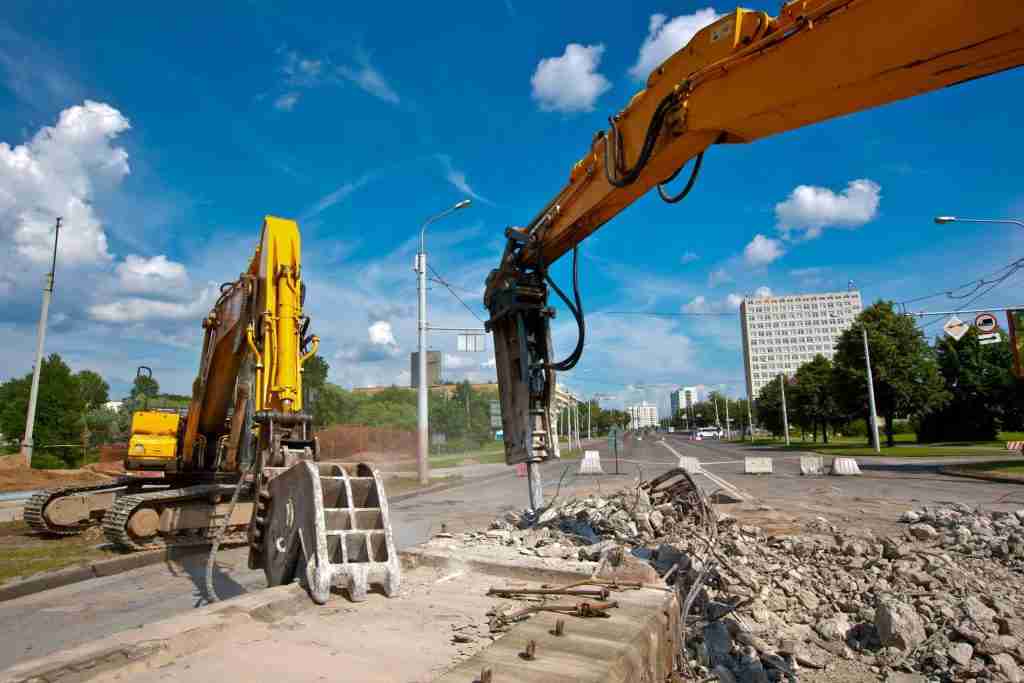Solida Forging
The ONLY through-hardened demolition tool for hydraulic hammers and hydraulic breakers
Demolition tools for hydraulic hammers are known by so many names: hammer points, hammer tools, hammer steels, hammer bits, tool bits, heavy demotion tools, boom-mounted demolition tools, chisels, moils, and blunts—and even some that we can only use in mixed company!
Hydraulic hammer steel is made from an alloy that uses various combinations of elements like silicon, nickel, chromium, molybdenum, and others, which vary in purity depending on what the demolition tool manufacturer feels is best for the application—in some sad cases—fits the budget.
The heat treatment known as the hardening process of a hydraulic breaker chisel is just as important as the steel selection process. Most people believe that you just dunk it in the hot solution for so many hours and pull it out. However, nothing could be further from the truth. When done carefully and correctly, the heat treatment process involves many hours inside and outside of a heat treatment tank at various temperatures. Hammer demolition tool hardening is less a process of the machinery used and more a craft practiced by experienced metallurgists and steel engineers who monitor and make adjustments to each batch of hydraulic breaker moil points that go through the heat treatment process.
And no one knows more about this craft than the Germans. For nearly 90 years, our partners at Solida of Germany have been building steel forgings and demolition tools. When the first hydraulic breakers were being designed in Europe, they reached out to Solida to help them build tools that would stand up to the pounding these new rock-breaking devices would place on their demolition tools. In addition to being an OEM supplier of heavy-duty boom-mounted demolition tools to world-renowned hydraulic hammer manufacturers, Solida supplies smaller breaker steel to fit hand-held pneumatic and electric impact hammers worldwide through brands you would see in any Home Depot, Loew’s, Grainger’s and other major contractor’s supply stores.
Solida begins by buying the best hydraulic-breaker-grade silicon, nickel, chromium, and molybdenum they can find. This is often done years in advance to secure the first purchasing position in the steel market. These components are then brought to a steel mill that has been in operation for over 100 years, where they are melted down and shaped into the exact final diameter the tool will be when it is inserted into the hydraulic hammer. These tools are then brought to Solida’s demolition tool manufacturing facility.
After the tool retainer notch or notches are cut out, Solida’s proprietary hydraulic breaker steel forging process shapes the tool’s working end. During this process, tools are not cut on a lathe into a four-sided moil, pyramid, blunt, chisel, or any other desired shape like all other manufacturers. Instead, the working ends of the hydraulic hammer steel at Solida are forged or crushed to their shape to force out impurities. These impurities can cause weak points that can lead to breakage. Remember how the starting tool diameter from the steel mill is preserved from the forge to being installed in a hydraulic breaker? Except for the retainer notches, the entire demolition tool, including its working or business end, is forged rather than cut apart on a lathe. This allows the hydraulic hammer steel to retain its original grain structure from top to bottom as it came from the steel mill. By maintaining this grain structure throughout the process, the Solida tool has a bit of “give” built-in, letting it flex a bit under use, making the hammer steel more resistant to breakage from harsh or improper use.
But what sets their tools apart is their one-of-a-kind hardening or core hardening process. Through special heat treatment techniques, Solida manages to build a demolition chisel, moil, blunt, or specialty tool that has the same HRC value—referred to as Rockwell hardness—in the center as it does on the outsides. Nearly all of the rest of the tools on the market are “case hardened,” which means that the steel is as hard on the outside as the “case”—but not as hard on the inside. Solida’s core hardening heat treatment process is the only one of its kind, and it produces a longer-lasting hydraulic hammer demolition tool as the inside “core”—wears as long as the outside.
The final result: An incredibly durable and breakage-resistant demolition tool that you can rely on.
Solida has been stocking tools to fit hydraulic breakers in the United States for over thirty years and Gorilla has enjoyed a twenty-year relationship as their stocking partner. Chisels, four-sided moils, blunts, and other working ends to fit all hydraulic hammer makes and models are stocked at Gorilla’s warehouse in the northeast, as well as additional warehouses in the southwest and Pacific Northwest.
Choose Gorilla Hammers For All Things Hydraulic Hammer
If you want the best solution to your tool breakage and wear issues, call (888) – 814-6745 and speak with a Hammer Advisor™ at Gorilla today. Our partnership with Solida ensures you’re getting top-tier, through-hardened demolition tools engineered for durability and breakage resistance. With Gorilla’s extensive inventory of Solida’s chisels, moils, blunts, and specialty tools available across the U.S., you’ll find tools that work as hard as you do, outperforming standard case-hardened alternatives. Trust Gorilla and Solida to provide the longest-lasting, most reliable hydraulic hammer tools on the market!

